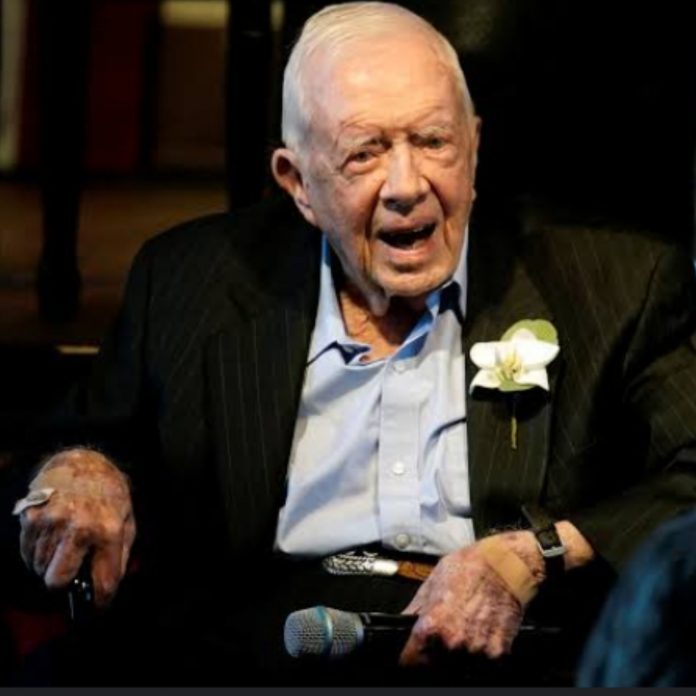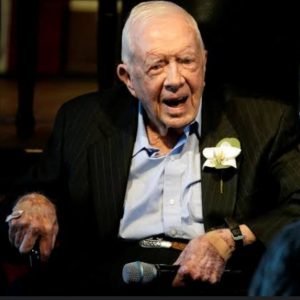Jimmy Carter
By Victory Oghene
The former president of the United State of America, Mr Jimmy Carter is Dead. Carter who’s the 39th president of the US served one volatile term from 1977-81. He reportedly died on Sunday at 100 after a yearslong battle with cancer during which he demonstrated the same personal strength that he displayed as president.
President Joe Biden honoured Carter ahead of his 100th birthday in October, writing to his predecessor, “Put simply, Mr. President, I admire you so darn much.”
Biden was the first sitting senator to endorse Carter for president in 1976, insisting the moderate Southern Democrat was best positioned to defeat incumbent Gerald Ford.
Carter would live to see Biden himself elected to the presidency, although he was too ill to attend Biden’s 2021 inauguration. He would famously go on to fulfil his pledge to vote for Biden’s Democratic vice president, Kamala Harris, in October.
Carter, who lived longer than any U.S. president, had been receiving hospice care, without medical intervention, since February 2023, so he could be with his family after what the Carter Centre described as a series of short hospital stays for undisclosed ailments. Nevertheless, he was spotted in public along with his wife of 77 years, Rosalynn, at the Plains Peanut Festival in his Georgia hometown in September.
Rosalynn, in May 2023, had been diagnosed with dementia and died Nov. 19 at age 96.
Carter’s 43-year post-presidency was the longest in American history. And while his four years in the White House were defined by national and international problems that he was unable to solve, he used his time out of office to work on many charitable projects, fight disease, monitor elections abroad and undertake peace missions that earned him the Nobel Peace Prize in 2002.
While Carter had what many considered a disappointing presidency, he earned back the respect and affection of people the world over for his work as a humanitarian, human rights advocate and hands-on builder of homes for the needy. The man voters eagerly discarded after one term went on to be considered America’s best former president.
Carter once told reporters that, while the presidency was his most important political experience, his work with the Carter Center in Atlanta, an organization named after him and devoted to research and humanitarian activism, was more “personally gratifying.” Through the centre, Carter said, he could directly help poor people around the world.
His post-presidency was impressive in other ways, as Carter demonstrated a deeply felt commitment to his Christian faith and his community. Even though other former presidents cashed in on their time in office with paid speeches and stints on corporate boards – and many never returned to their pre-presidential communities – Carter was different. He made money from his many books, but he wasn’t overly materialistic. He brought attention to a now-well-known project called Habitat for Humanity, which builds houses for poor people.
The former president and his wife famously participated personally in many building projects.
Born James Earl Carter Jr. – and known all his life as Jimmy – the former president came from modest beginnings. He hailed from Plains (population about 600) where his father, James Earl Carter, was a successful farmer and small businessman who, for a while, ran a grocery store. His mother, the former Bessie Lillian Gordy, was a nurse. Four years after Carter was born, the family moved for a while to nearby Archery, Georgia, even smaller than Plains. Jimmy had three siblings, Gloria, Ruth, and Billy, and their father required hard work from all of them around the farm and in his other enterprises.
Carter was studious as a boy, also very patriotic and family-oriented. He graduated from the U.S. Naval Academy in June 1946 and married Rosalynn, his sweetheart from home, the following month. He was assigned to the U.S. submarine fleet, serving aboard the USS Pomfret as an electronics officer, among other assignments. It was during his Navy career that Carter, training for a role as engineer on a nuclear submarine, was involved with mitigating an incident at a nuclear reactor in Canada. The government of Canada describes the 1952 incident at Chalk River Laboratories in Ontario as “the world’s first nuclear reactor accident,” saying the facility experienced “mechanical problems and operator error that led to overheating fuel rods and significant damage.” Carter was widely credited with helping prevent an accident from spiralling into a disaster.
After his father died in 1953, Carter gave up his promising career in the Navy and returned to Plains to help run the family businesses, especially the peanut farm.
He won two terms in the state Senate and was elected governor of Georgia as a moderate Democrat in 1970. Serving one term, he audaciously decided to run for president in the 1976 election, casting himself as a maverick, a truth-teller, and a Washington outsider. He surprised the political pros by winning the Democratic nomination and narrowly defeating Republican incumbent Ford in the popular vote 50.1% to 48% and 297-240 in the Electoral College.
But Carter will always be known for his post-presidency.
After the White House, he went back to Plains. He wrote his books there, and for years, he and Rosalynn made a habit of pedalling their bicycles around the town for recreation. He seemed to know all the local merchants and helped his community by volunteering on community projects and in other ways. He worshipped and taught Sunday school at Maranatha Baptist Church in Plains, sometimes mowed the lawn there and tidied up after services.
There was much for him to forgive in the treatment he received from his critics while he was president, but he tried to move beyond all that.
Once an outsider who never fit in with the Washington political arena, he struggled to navigate as president, Carter later became the subject of admiration and affection by some of the most prominent figures in American politics. Words of tribute and support came from both sides of the political aisle when the Carter family announced Feb. 18, 2023, that the former president would enter home hospice care for his final challenge – facing a cancer that had spread from his liver to his brain and that he knew amounted to a death sentence.
Georgia politicians, from Republican Gov. Brian Kemp to Democratic Sen. Rafael Warnock issued statements of support. Former President Bill Clinton, a Democrat, tweeted on President’s Day 2023 that he was thinking of Carter – almost 50 years after he first declared his candidacy for the nation’s highest office in December 1974.
Carter elevated his national profile back then with a promise not to lie and a pledge to bring integrity and a common touch to the White House after the imperial reign of Richard Nixon, who resigned amid the Watergate scandal. Ford, as vice president, succeeded Nixon in office but didn’t fully connect with the American people despite his personal decency and many years as a distinguished member of the House of Representatives from Michigan.
Once in office, Carter did his best to limit the trappings of the imperial presidency. He ordered his staff not to have a band play the martial anthem “Hail to the Chief” when he entered a room. He wore cardigans to show his casual approach and to make the point that he had lowered the thermostats in the White House to save energy. For a while, he carried his own hand luggage aboard Air Force One when travelling. He held town meetings to stay in touch with everyday people. He advocated energy conservation and less reliance on foreign oil. And Americans liked their new president – initially.
But as the nation’s problems intensified, the public turned on him. The economy got worse. Inflation rose. So did unemployment. Gasoline shortages resulted in huge lines at filling stations across the country and unsettled millions. The Soviet Union invaded Afghanistan, a signal to many that Carter wasn’t perceived as a strong leader internationally and could be defied by America’s adversaries. In response, Carter announced a boycott of the Olympic Summer Games in Moscow in 1980, a protest that saw support from a significant number of American allies.
Carter concluded that Americans were suffering from an epic loss of confidence. At one point in 1979, he cancelled a major energy speech and secluded himself at Camp David, the presidential retreat in Maryland’s Catoctin Mountains. For eight days, he met privately with advisers there and contemplated what to do next. The result was what critics called “the malaise speech.” He didn’t actually use the word “malaise” but argued that the country was suffering from a profound “crisis of confidence” that damaged the nation’s “heart and soul.” His critics said Carter was really blaming the country for his own flawed leadership. When he fired half his Cabinet a few days later, he seemed hopelessly adrift. He never recovered politically.
“Carter’s eventual difficulties with a heavily Democratic Congress sprang as much from his personality and cultural divides within the Democratic Party, as from ideological differences between Carter and his fellow partisans,” wrote political scientist Alvin Felzenberg in “The Leaders We Deserved.” “Proud that he had won the presidency, without having had to court party power brokers or representatives of special interests, Carter took office believing he owed nothing to the political establishment that he had defeated on the way to the nomination.”
His administration scored some successes, at least in retrospect. During 1978, his second year in office, he won Senate approval for transferring control of the Panama Canal to Panama. He negotiated the Camp David Accords, a major peace agreement between Israel and Egypt. Carter argued in favour of energy conservation, a stance that was not very popular at the time, but that resonates much better today. He made human rights a cornerstone of American foreign policy – a goal that remains widely admired, even though his critics said he was naive and impractical at the time.
In one of the worst setbacks to his presidency, Islamic extremists seized the U.S. Embassy in Tehran and held 53 Americans hostage for more than a year. Carter seemed powerless to get them released. When he ordered a rescue mission that failed miserably, his popularity declined even further.
In 1980, he suffered a shattering defeat in his bid for reelection, losing to Republican challenger Ronald Reagan by an overwhelming margin and winning just six states and the District of Columbia. He was hurt and embarrassed by this repudiation, and it took him a long time to put the memory behind him.
He was particularly proud of having avoided a war during his presidency. And he took comfort in having led the diplomacy that resulted in the freeing of the Iranian hostages, although it happened by design on the very day that Reagan was sworn in as president in January 1981 – too late for Carter to get credit for it. Reagan supporters said the hostages were freed because the Iranian leaders were afraid of what Reagan would do if the crisis persisted.
In the decades after his presidency, Carter made a point of tracking political prisoners and working behind the scenes to help secure their release. In 2010 at the age of 85, he traveled to North Korea to secure the release of Aijalon Gomes, who was imprisoned for entering into North Korea from China for what is believed to have been missionary purposes.
In a sign of the enduring esteem in which Carter was held, North Korea said it would release Gomes if the former president traveled personally to retrieve him.
The final truth about Jimmy Carter was that he concluded, as did so many others, that his real legacy was not being a good politician or a good president but being a good man.


